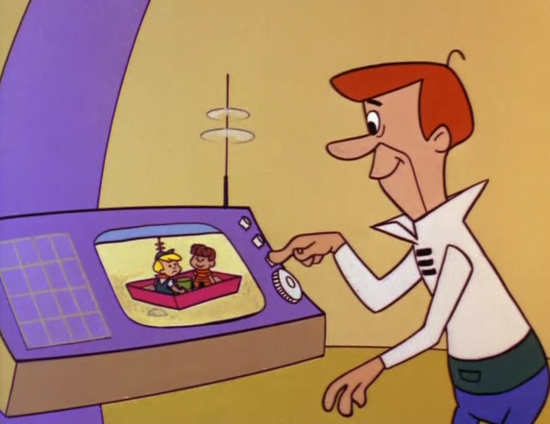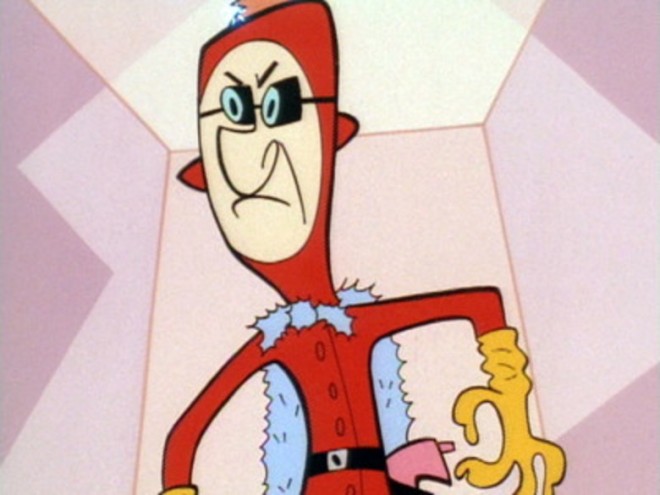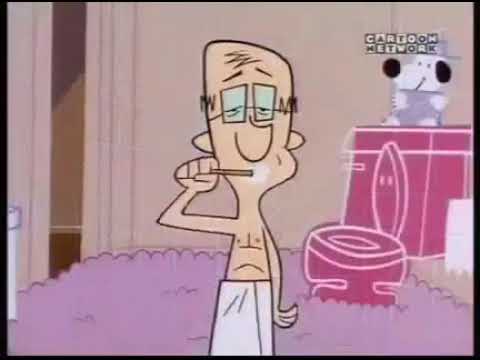

The premiere of Hanna-Barbera’s sitcom The Jetsons in 1962 introduced America to your average nuclear family of the distant future. This served as Hanna-Barbera’s counterpoint to their other animated sitcom The Flintstones, which premiered two years prior. Just as The Flintstones did with its prehistoric setting, The Jetsons used its Space Age setting to make social commentary about the rise of consumerism in the immediate post-World War II economy.
The world of The Jetsons is a world filled with gadgets and appliances to handle any menial tasks. Housework, meal preparation, and personal hygiene can be done at the push of a button and are fast and efficient. And any other tasks around the house are taken care of by a robot maid like Rosie.
Such is the life in the world of The Jetsons. So technologically advanced and convenient that the arduous task of walking is a thing of the past.
Most of the time, the biggest source of tension in The Jetsons comes from family patriarch George’s job. He works as a sprocket manufacturer at Spacely Space Sprockets, Inc. His boss, Cosmo Spacely, is domineering, short-tempered, and extremely demanding of George. A running gag in the series is how often Mr. Spacely fires George.
Approximately 35 years after The Jetsons, another Hanna-Barbera series The Powerpuff Girls introduced us all to Harold Smith in the episode “Supper Villain”.

Harold Smith lived a quiet life in the suburbs next door to Professor Utonium and the Powerpuff Girls with his wife and two kids. There was a consistent routine to his life; wake up, get ready for work, eat pancakes for breakfast, go off to work screwing lids on to jars of mustard, go back home in the evening, rinse, repeat. Harold felt miserable in the bland routine of his life. The only source of excitement he found was in paying close attention to the news reports about the Powerpuff Girls and the Mayor of Townsville being held hostage by Mojo Jojo, morbidly rooting for Mojo Jojo. When the Powerpuff Girls and the Mayor finally broke free and place Mojo in custody, Harold became so incensed at the outcome that he decided to take villainy into his own hands.
So what does all of this have to do with The Jetsons?
To further explain something I mentioned earlier, The Jetsons took a dig at how much consumerism has reduced suburban life into a rote routine day to day. Not to mention George’s job is to literally create cogs for the machine, all while the threat of termination constantly looms over him. However, these jabs the show takes are relatively mild. Overall, the show’s tone aligns with that same sense of optimism and wonder towards the technological advances of the future that President John F. Kennedy sparked across the country at that time.
By the time we get to Harold Smith in the late ’90s, a new generation had gone on to live their adult lives through the typical work/nuclear family routine and they voiced their dissatisfaction with it more than before.
I think it’s interesting to note that “Supper Villain” and Fight Club came out the same year; 1999. This is the year that also saw the release of films like The Matrix, American Beauty, and Office Space. All of these films have working-stiff male protagonists with a desire to escape from the rote, unfulfilling suburbia hell life has become. A desire to escape that feeling that all your role is in life is just to be another drop of water in a big bucket or just another cog in the machine. From there, these films all go in different directions, like how The Matrix becomes a power fantasy for the viewer (with Neo as the audience surrogate) or how Fight Club becomes a critique of how masculinity is constructed in our society. I don’t think “Supper Villain” goes as deep as any of these films, but I think its interesting that it touches on similar themes. I also think it’s interesting how the overall view of this type of adult life was viewed in 1962 versus in 1999.
To be clear, this negative critique of the conformist “get married, move to the suburbs, have kids, and work for the rest of your life” lifestyle didn’t begin in the late 1990s. The sitcom Married With Children was all about how miserable and demeaning life as a working stiff family patriarch is. National Lampoon’s Vacation also takes to task all the false promises boys of John Hughes’ generation were told would come true as soon as they grew up. Robert Crumb drew comics all about the misery of toiling life away working a menial manufacturing job in the Midwest less than ten years after The Jetsons aired (actually, he literally fled from his wife, kid, and 9-to-5 job in Cleveland to go live a much more exciting life in San Francisco!).
It’s a little strange thinking about how miserable all these men felt in their workaday lives. These are all stories told by Baby Boomers and Gen Xers. I’m a Millenial who by a stroke of luck, happened to finish high school around the same time the world economy tanked in the late ’00s. The type of jobs that characters like Harold Smith, Neo, or the Fight Club narrator felt that they were wasting their lives in have either been outsourced or automated. Considering that these were jobs with benefits and paid enough to raise a family on and save up for retirement, someone from my vantage point is inclined to say “what the hell are you all complaining about?!”
I imagine the Millenial version of this theme would be as the lost children crushed under the boot of late stage capitalism. The promises of finding lifelong and stable employment after graduating from college were not kept. Economic inequality this day and age is comparable to the Gilded Age, perpetual war and military occupation rages on in a steadily increasing number of countries, and catastrophic weather patterns brought about through climate change grow more frequent. And unlike the narratives of George Jetson or Harold Smith, these stories can’t only focus on white men. As generations before us have picked apart all the holes in what “the American Dream” is supposed to have been, this generation has questioned who is socially and economically served the expectation to achieve it in the first place, and who isn’t.
Dang, this is a pretty depressing note to end on, isn’t it?
Here’s a cheerier note to end on!